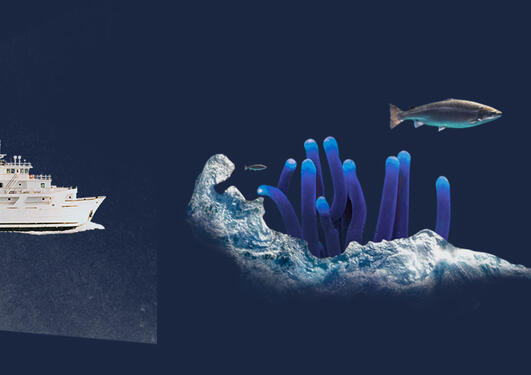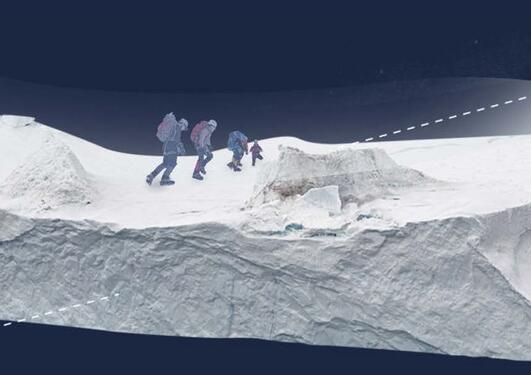Research possibilities for the SEAS postdoctoral research fellow in epistemic, value-based, and societal aspects of marine sustainability
The information on this page is a supplement to the complete advertisement of the position in the recruitment-portal Jobbnorge. The full advertisement of this position in Jobbnorge will be available after august 1, and linked from this webpage. Call deadline is October 31, 2021.
Main content
Position | SEAS postdoctoral research fellow at Centre for the Study of the Sciences and the Humanities |
Research areas | Epistemic, value-based, and societal aspects of marine sustainability (several sub-theme options) |
Available supervisors | |
Mobility | For an incoming candidate |
Unit of employment | The Centre for the Study of the Sciences and the Humanities at University of Bergen |
Group affiliation(s) | Interdisciplinary studies of Knowledge, Values and Society |
Available supervisors and thematic areas
This position will be connected to one of the following thematic areas:
- Either 1) The nature of suffering in marine lifeforms; 2) marine life forms as objects for knowledge and public display; or 3) imaginaries of human health in aquaculture.
Supervisor: Associate professor Jan Reinert Karlsen - Evolving Marine Science-Society-Policy Nexus: 1) Evolution of human values, behavioural norms, and rules relating to past, present, and future coastal and/or marine contexts and resource use; 2) Marine values, identities, and behaviours in fisheries and/or seafood value chains; or 3) Management, policy, and governance of human coastal and marine activities within seascapes.
Supervisor: Dr. Mimi E. Lam - Ethical and Environmental Aspects of Novel Feeds and Circular Economy in Aquaculture.
Supervisor: Professor Roger Strand
The position is open to an incoming candidate, see mobility rules. Information about the supervisors and research possibilities for the fellow is available below. The successful candidate will be employed at the Centre for the Study of the Sciences and the Humanities, and included in the research group Interdisciplinary studies of Knowledge, Values and Society (‘Vitenskapsteori’).
For further details about the research possibilities please contact the relevant supervisor(s).
Jan Reinert Karlsen: 1) The nature of suffering in marine lifeforms; 2) marine life forms as objects for knowledge and public display; or 3) imaginaries of human health in aquaculture.
Supervisor: Associate professor Jan Reinert Karlsen.
Research context: The postdoc will work in close collaboration with Associate professor Jan Reinert Karlsen and his Research group The Philosophy of Neurodegeneration at Neuro-SysMed as well as the Research group Theory of science at the Centre for the study of the sciences and the humanities (SVT), University of Bergen (UiB), where Karlsen is a member. SVT is an interdisciplinary and inter-faculty research unit at the UiB. Neuro-SysMed is the first centre of excellence for clinical treatment research in Norway, where Karlsen is a PI.
Research interests and competencies: Karlsen work within the research framework theory of science (‘vitenskapsteori’; follow link for more information about the specificities of this academic field). From this framework he has investigated philosophical and ethical issues in the science-society interface, including the ethics and politics of biobanks and transplantation medicine, the concept of scientific ideology in modern genetics, the concept of plasticity in neuroscience, the epistemology of surveys in educational policy, and interdisciplinarity in teaching and learning. He has extensive experience in interdisciplinary collaboration in both teaching and research, including ELSA/RRI-projects. Karlsen’s current research is on the concept of suffering in relation to precision medicine in severe chronic neurological diseases (at Neuro-SysMEd) and the evidence base for lifestyle interventions in public health policy and practice (at SVT).
Research topics: The postdoc is expected to work within the theory of science framework and choose between three topics: 1. The concept of suffering in marine life forms; 2. marine life forms as objects for knowledge and public display; 3. imaginaries of human health in aquaculture. Also, it is expected that projects on these topics are case driven and allows for investigation of assumptions and implications in broader philosophical, ethical, and societal terms. As to the second and third topic, the postdoc will work together with the Research group Theory of science. As to the first topic, the postdoc will also work together with the Research group The Philosophy of neurodegeneration and contribute to its efforts to develop an analytical framework for studying suffering in humans and investigate if and how it may be adapted to the study of non-humans, e.g., fish (do fish suffer?), as well as explore theoretical and practical implications for research on suffering and society. If the applicant is able to design an interesting project that involve several of the aforementioned topics, that is also a possibility, but not a requirement.
International collaboration and networks: Both Neuro-SysMed and SVT are embedded in of international research environments and have extensive international networks that the successful applicant may connect to for longer or shorter research stays.
Collaboration with other institutions and sectors: The SVT has previous and ongoing collaborations with a number of relevant institutions, such as The Norwegian Biotechnology Advisory Board, the Institute of Marine Research (Havforskningsinstituttet) and other possible secondment institutions.
Relevance for innovation: Neuro-SysMed is establishing a research school in innovation and facilitates innovation processes.
Infrastructure: Office space, access to necessary academic infrastructure (internet, library, etc.).
Mimi E. Lam: Evolving Marine Science-Society-Policy Nexus
Supervisor: Dr Mimi E. Lam, Centre for the Study of the Sciences and the Humanities
Research Sub-themes
The thematic area of Evolving Marine Science-Society-Policy Nexus encompasses but is not limited to 3 sub-themes central to Dr Lam’s interests and expertise:
- Evolution of human values, behavioural norms, and rules relating to past, present, and future coastal and/or marine contexts and resource use. This is investigated using human eco-cultural niche construction theory and agent-based modelling.
- Marine values, identities, and behaviours in fisheries and/or seafood value chains. This includes: conceptually, to identify marine values, identities and behaviours and how they inter-relate; and empirically, to integrate this understanding into marine policy and governance frameworks.
- Management, policy, and governance of human coastal and marine activities within seascapes. This merges sense of place with modelling to evaluate trade-offs among management scenarios in an ethical value-based framework resonant with the UN Sustainable Development Goals.
Postdoctoral candidates are invited to propose research projects that fit within any of these 3 sub-themes or to propose other projects that fall within Dr Lam’s research interests and competence.
Supervisor Research Interests and Competence
A transdisciplinary scholar, Dr Lam’s research spans the physical, ecological, and human sciences to analyze the complex interactions and mechanisms governing social-ecological systems, notably at the evolving marine science-society-policy nexus. Lam investigates human values, beliefs, and behaviours to gain insights into our past, to resolve today's grand societal challenges, and to inform ethical decision-making for a sustainable and just future. She collaborates routinely with scholars from varied disciplines (e.g., archaeology, biology, ecology, law, mathematics, oceanography, philosophy, and psychology), as well as stakeholders and citizens with diverse perspectives and knowledge (e.g., local and indigenous communities, industries, governments, NGOs, artists, and civil society).
International Research Network
Lam has an international research network that spans Europe, North and South America, Australia, Asia, and Africa. Ample opportunities exist for the postdoctoral fellow to collaborate with eminent marine researchers and/or visit world-class research institutions, notably at the University of British Columbia, Institute for the Oceans and Fisheries, where Lam is an Affiliate Assistant Professor, and CSIRO Oceans and Atmosphere.
Interdisciplinary Research Environment
Lam’s international collaborators are experts in diverse disciplines, spanning the natural and social sciences and the humanities, offering a ‘radically interdisciplinary’ research environment for the postdoctoral fellow. This provides fertile ground for research creativity, insight, and knowledge transfer across disciplines and cultures. Lam’s interdisciplinary projects and research teams include: 1. Managing Ethical Norwegian Seascape Activities (MENSA); 2. Enhancing Seafood Ethics and Sustainability (eSEAS); and 3. The Ethical Challenges of Herring Food Webs and Value Chains.
Transdisciplinary and Cross-sectoral Opportunities
Lam’s broad network provides diverse transdisciplinary and cross-sectoral opportunities for the postdoctoral fellow, notably for secondments and mentors, within all non-academic marine sectors. National industrial collaborators are Norway’s Deep-sea Fishing Fleet Organization and The Norwegian Fishermen’s Association, while the AFINO network links responsible research with innovation. European governmental partners include: Institute of Marine Research; NORCE Research; International Council for the Exploration of the Seas; European Commission Joint Research Centre; and Food and Agriculture Organization of the United Nations. Global NGOs such as World Wide Fund for Nature and Gordon and Betty Moore Foundation offer marine conservation perspectives and experiences.
Potential Co-supervisors/Mentors from UiB Collaborations
Lam collaborates with numerous UiB researchers who can serve as co-supervisors and/or mentors from multiple faculties and centres, viz.: Faculty of Humanities (notably SapienCE), Faculty of Mathematics and Natural Sciences (primarily Departments of Biological Sciences, Earth Science, and Mathematics); Faculty of Psychology; Faculty of Law; Faculty of Medicine; and Bjerknes Centre for Climate Research.
Roger Strand: Ethical and Environmental Aspects of Novel Feeds and Circular Economy in Aquaculture.
Supervisor: Professor Roger Strand, Centre for the Study of the Sciences and the Humanities.
The research focus of Professor Strand and his co-workers is governance in complexity. This focus is subjected to interdisciplinary research that draws on science and technology studies (STS), the Scandinavian research tradition of vitenskapsteori («theory of science», comparable to philosophy of science in practice and HPSS – history, philosophy and sociology of science), sustainability science including post-normal science, environmental science, environmental and medical philosophy, and ethics. Specific case studies span from nexus governance in the EU, including novel feeds and the circular economy, to transformative research and innovation policy, governance of emerging technologies, and medical (clinical) decision-making under uncertainty and complexity. Case studies and practice fields are in other words heterogenous while the research approach is firmly grounded in post-normal science and complexity studies. The postdoc would focus on nexus issues related to aquaculture, including the issue of novel feeds and the development and implementation of circular economy policies. The postdoc project will predominantly have a social science/humanities (SSH) orientation and will accordingly find sufficient infrastructure at our research centre at the Faculty of Humanities.
International research collaborations of particular relevance to the scope of the postdoctoral position would be our long-standing collaborations in Barcelona, particularly with Prof. Mario Giampietro at the Autonomous University of Barcelona, and Dr. Zora Kovacic at the Open University of Catalonia.
Trans-sectorial collaborations of particular relevance to the scope of the postdoctoral position would be with regional, national and European authorities especially with regard to the circular economy. We have a particularly constructive collaboration with the EEA (European Environment Agency) and are also in contact with the Norwegian Environment Agency (Miljødirektoratet) on this issue. Furthermore, there is a tight academic collaboration between Strand’s research at the SVT and the non-profit NGO European Centre for Governance in Complexity.
Strand collaborates with researchers across all faculties at the University of Bergen. For this postdoc project, the choice of internal collaboration will depend on the recruited candidate but the more likely choice would be with sustainability researchers at the Dept of Geography, Faculty of Social Science.
Relevant references:
- Cadillo-Benalcazar et al. (2020), https://www.sciencedirect.com/science/article/pii/S0959652619340806?via%3Dihub
- Kovacic et al. (2019), https://www.taylorfrancis.com/books/oa-mono/10.4324/9780429061028/circular-economy-europe-zora-kovacic-roger-strand-thomas-v%C3%B6lker
See the full advertisement in Jobbnorge
The full advertisement in Jobbnorge will be available after august 1, 2021. Call deadline is October 31, 2021.

